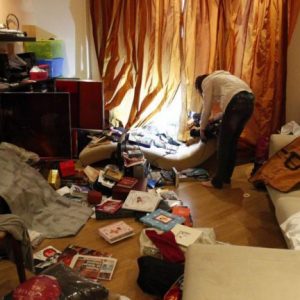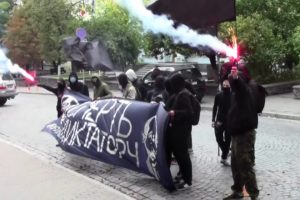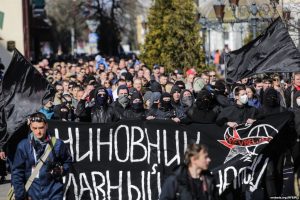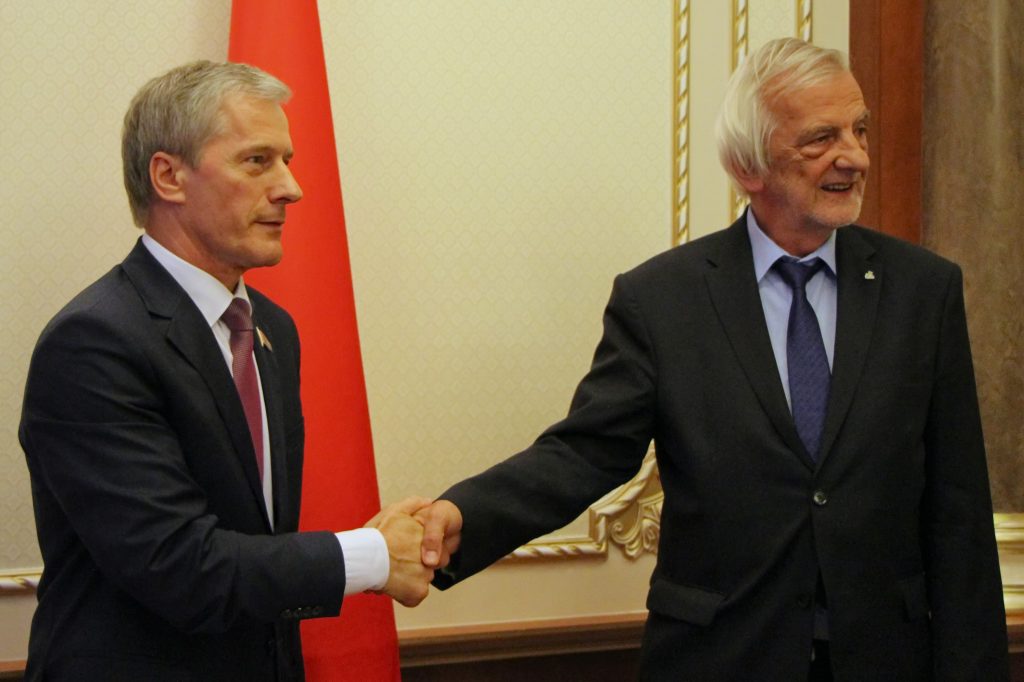Belarusian authorities increase pressure on anarchists

On 26 September, Belarusian secret services raided the apartments of several Belarusian anarchists and environmentalists.
This became yet another case of repression against Belarusian anarchists in recent months. State authorities have been on alert since the outbreak of protests in 2017 against decree № 3, a presidential decree which levies an unemployment tax on Belarusian residents who work fewer than 183 days per year. Anarchist groups took an active and sometimes leading role in the 2017 demonstrations.
The authorities appear uncertain how best to deal with the grassroots, Belarusian anarchist movement. Unlike other contemporary social factions, anarchists represent a close-knit, cohesive and relatively new movement in Belarus. By conducting searches and prosecuting anarchists for their role in protests, the authorities again demonstrate their resolve to suppress social and political activism.
Raiding the apartments of activists
On 26 September, representatives of the Belarusian KGB burst into the apartments of two activists—Marina Dubina, a representative for the Ecadom organisation, and journalist Marina Kastylyanchanka. In addition, well-known anarchist and former political prisoner Mikalai Dziadok reported on his Facebook page that security forces searched the flats of several other anarchists.
One activist said the search of her apartment lasted more than 10 hours. During the long search, the KGB seized computers, books, and money. Some of the activists claim they were assaulted. On 27 September, a special press-conference was organised by Belarusian anarchists groups to draw wider attention to the raids. Anarchists Ihar Truhanovich, Yauhen Dziatkouski, and Alena Nemik shared their experiences about the incidents.
Ihar Truhanovich said the security officers were violent and damaged his belongings. He claims they beat him and stole €500 from him. Other activists said security officers did not explain why they confiscated certain items, such as computers and telephones.
The human rights centre Spring believes search warrants were issued on grounds of hooliganism. In July, a group of anarchists set fire to a billboard in Ivatsevichi, a city in Belarusian region of Brest, that read “The Strength of Law in Its Implementation.”
However, it is doubtful the burning of the billboard is the cause of the raids. Two people, Ihar Makarevich and Kirill Aliakseeu, are already serving sentences for setting the billboard on fire. Another possible explanation is that the KGB raids may be an attempt to maintain an atmosphere of fear among activists.
A new wave of repression against Belarusian anarchists
Pressure on anarchists has became especially noticeable in recent months. Anarchists have become one of the most prominent groups during demonstrations against the “social parasites decree.”
Dozens of anarchists were arrested during the 2017 spring protests. In addition, two representatives of the movement, Ihar Makarevich and Kirill Aliakseeu, received prison terms for a demonstration in Ivatsevichy, the same city where the billboard praising tough law enforcement was set alight.
On 27 August, police detained 15 anarchists on their way to attend a lecture by Russian anarchist Alexey Sutuga in the city of Baranavichy, also in the Brest region. A district court accused two of the detainees and the Russian lecturer of extremism, informs newspaper Nasha Niva.

Anarchists at the Belarusian Embassy in Kiev. Source: revdia.org
On 23 September, anarchists in Kiev began their “Death to the Dictatorship” campaign. They hanged a hand-made effigy of Belarusian President Alexander Lukashenka on the fence of the Belarusian Embassy in Kiev. The activists pointed out that both local and international media were reluctant to cover their picket.
Later, the Belarusian Embassy in Kiev appealed to the Ministry of Foreign Affairs of Ukraine complaining about the demonstration arranged by “20 aggressive young people.”
Authorities continue to pressure anarchists under vague pretexts. For example, on 21 September, anarchist Raman Halilau was accosted by police and fined for having insufficient identifying documents. Halilau said two police officers stopped him on the street and searched his pockets. They then demanded he come to the police station to verify his identity, despite the fact he had already given them his passport. During the 2017 spring protests, a court sentenced Halilau to 21 days detention for participating in demonstrations that took place in Brest city. Halilau claims police beat him while he served his detention.
So far, the reason why the raids took place on September 26 and why at the apartments of those particular activists remains unclear. Vyachaslau Kasinerau, a well known Belarusian anarchist accused of anti-regime graffiti, said in an interview with Radio Free Europe/Radio Liberty: “It (the searches in the apartments of the activists – BD) is possible if we consider recent events. Authorities set a goal to infringe upon all anarchists, because it is one of the few movements that have not submitted.”
New targets for the Belarusian authorities?

Anarchists at the march against the decree. Source-svaboda.org
The peculiarity of the anarchist movement in Belarus lies in its organised nature and high degree of secrecy. Anarchists appeared at the forefront of the 2017 spring protests.
The rise of the anarchist movement effectively caught law enforcement agencies by surprise. In response, the authorities are now trying to crush the movement with searches, detentions, and interrogations.
Football fan activists in Belarus are under the same pressure. Belarusian authorities also see football fan activists as a potential threat. After the Euro Maidan protests in Ukraine, in which football fans played a significant role, Belarusian authorities have paid close attention to the participation of football supporters in domestic social movements.
For example, Ilya Valavik received a 10-year prison term for fighting on public transport. However, his wife believes the real reason for his long sentence was his involvement in Belarusian protest movements.
Belarusian social and popular movements continue to develop and intensify despite conditions created by the regime. The authorities, for their part, are testing new methods of repression and are ready to use violence. In the past, political opposition party activists were the authorities’ main targets. However, the list of victims has grown to include more closed and organised movements, such as anarchists, environmentalists, and football fans.








